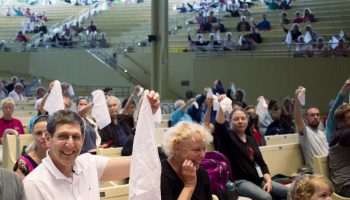Since Chautauqua’s newspaper, then called the Assembly Daily Herald, didn’t begin until 1876, the Assembly’s third year, it was not until Aug. 2, 1876 that we get a newspaper account of their anniversary celebration — what is now called Old First Night. Indeed, so new was the Assembly that the evening of Tuesday, Aug. 1, 1876, was more a simple opening than it was an anniversary.
A front page article in the Aug. 2 newspaper reported, “Fair Point wore its most beautiful dress last evening when the hour arrived for the opening services connected with the Third Sunday-school Assembly. The heavens were clear and an elegant sunset decorated the sky with gorgeous colors; the air was balmy, and not a leaf rustled in the tree-tops.”
There was a peal of three bells at half past seven to announce Vespers in the auditorium, now Miller Park. People arrived by boat all day, wending their way from the docks with their baggage, convincing the writer, “there would be a large attendance at the opening service.”
On Aug. 7, 1883, the newspaper, its name now shortened to the Assembly Herald, announced the opening of the 10th season with a sense of having made history, recognizing itself as part of a tradition. “The Vesper Service with which the 10th Chautauqua Assembly will be opened this evening is the same that was used at the opening of the first Assembly August 4, 1874,” the article began.
The writer expressed gratitude for the steady progress and growth of the Assembly, its beauty and appropriateness. With each passing year, with each repetition, the project seemed more certain, indicating that “its conception was an inspiration. So often repeated, it has become the center around which hallowed associations and tender memories cluster.”
The mood was exuberant. The Aug. 8 article that reports on the birthday celebration is titled “XXX: TENTH BIRTH-DAY,” the repetition of the roman numeral X indicating confidence, a graphic excess unusual in comparison to the newspaper’s otherwise modest presentation of daily events. “Nature seemed yesterday to respect the decimal system and honored the tenth birth-day of the Chautauqua Idea with a day ‘as grateful as a benediction after prayer,’ ” the article began.
Attendance was spectacular. “All day from boats and cars large additions to the great number on the grounds debouched and disappeared, until by nightfall the reservoirs and hiding places of humanity in which Chautauqua stows her great crowds began to show signs of congestion, and humanity began to stick out of the windows and top over on the verandahs and lawns of cottages, boarding-houses and hotels.”
The celebration was held in the Amphitheater. At seven o’clock the chimes sounded a “sweet jangle,” although their call to meeting was needless, so many people had arrived eager and early. “The consecrated Chautauqua Vesper Service was never said and sung with more fervor than on this tenth time.”
Assembly co-founder John Heyl Vincent addressed the crowd. “Dear friends,” he said, “it is with great pleasure that I bid you all welcome to Chautauqua. You who have been here before are welcome to the delights of memory, to renew your companionship, to taste again the delights of other seasons. You who for the first time come to Chautauqua, are especially welcome, welcome to the new experiences, to the new fellowships, and to the new aspirations.”
Vincent made the crowd laugh, calling attention to the accretion of years, the steadying foundation, in the face of unpredictable weather: “Through all these years we have met on the first Tuesday evening of August sometimes under the witchery of moonlight, sometimes under the rains that once in awhile in ancient times visited Chautauqua, [Laughter.]” Chautauquans, Vincent suggested, could brave inclement weather, “always glad for the reunion, for the privilege of singing their songs, clasping their hands as brethren, rejoicing in the past, and hoping for the future.”
By 1886 confusion had arisen regarding the First Night celebration and the actual opening of the Assembly. Activity on the grounds had consistently begun earlier and earlier in the summer. There was now a preseason, a sign of the Assembly’s spreading popularity, and in announcing opening day, the Aug. 3 edition of the Assembly Herald took a moment to address the issue. “The opening to-night is by many scarcely understood,” the front page article said. “Why is not the whole two month’s session the Assembly? What is the distinctive feature of these three weeks that you are beginning? Why speeches, rejoicing, illumination, fire-works to-night more than any other night?”
The dilemma was solved, if not entirely the confusion, in 1894, the 21st season of the Chautauqua Assembly. An editorial in the Tuesday, Aug. 7, edition of the newspaper announced that the celebration honoring Chautauqua’s 1874 origin would now be called Old First Night. The editorial began: “Tonight at eight o’clock in the Amphitheatre will occur one of Chautauqua’s great festivals, the oldest of them all in fact, and the best, the anniversary of the formal opening of the first Chautauqua Assembly.”
The line between the preseason and the season had to be obliterated. From this point on the Assembly would be opened from the first day of the season, no matter how early in July or even June the summer session might begin.
“An Assembly now means the whole season from the first day of July, or thereabouts, to the last Monday night in August. It would therefore be a misnomer to longer call this old time anniversary an Assembly Opening when the event itself really occurred several weeks before.”
While the name would be altered, “the old aroma will linger about this glad occasion,” the editorial said. “Chancellor Vincent will preside as on that royal First Night; many of the old favorites will appear, with the usual quota of new ones; the usual display of oratorical pyrotechnics will take place — all rockets or bombs of the first magnitude — at 8 o’clock in the Amphitheatre, and of the other sort on the Lake Front at 9:45.”
There would be music and good humor, there would be “fresh sallies of wit and mirth.” There would be the greatest audience of all seasons. “Let everybody come to the anniversary of ‘Old First Night,’” the 1894 editorial said.




